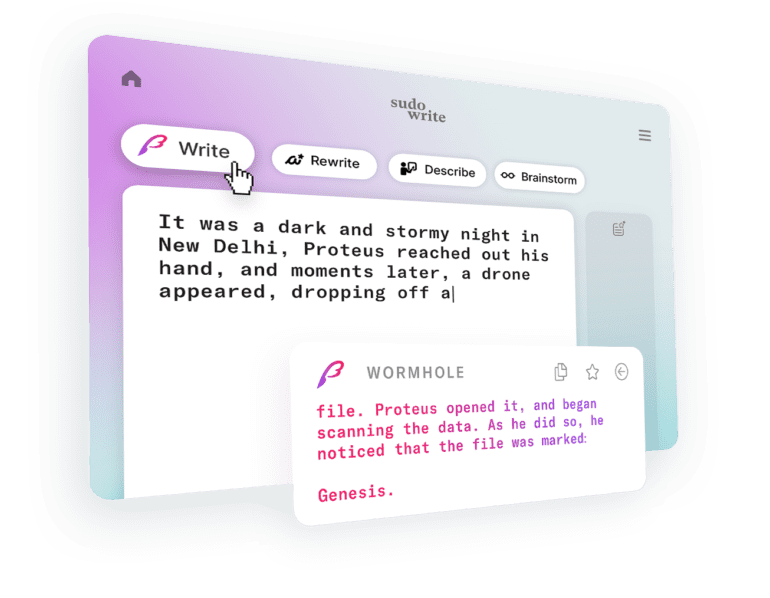TL;DR:
- Sudowrite, an AI-focused startup, has launched Story Engine, an AI tool for writing long-form stories.
- It claims to generate a page of words quickly and offers features like plot points, character arcs, and character naming.
- Founder James Yu claims that authors can collaborate with AI to write an entire novel in a few days.
- Sudowrite is based on OpenAI’s GPT-3 and specializes in AI-generated storytelling.
- Sudowrite’s tool, Story Engine, resolves issues and helps the AI focus on coherent story processing.
- However, there are doubts about whether AI-generated stories can truly reflect an author’s vision.
- The tool’s release comes amidst concerns about AI replacing human writers, which has led to strikes by the Writers Guild of America.
- The industry has offered only discussions about technology advancements rather than job security.
- The strike has garnered support from various writers and content creators who oppose the threat AI poses to their livelihoods.
Main AI News:
In the realm of literature, crafting a captivating storyline and developing compelling character arcs can be an arduous task that takes authors weeks, months, or even years. These authors pour their very essence into their work, infusing it with their own experiences and personality, allowing their creative vision to leap off the pages and resonate with readers. But what if this essence could be drained away, replaced with lifeless prose generated by a recycling robot? It appears that Sudowrite, an AI-focused startup, envisions such a future.
Recently, Sudowrite unveiled its latest creation, Story Engine—an advanced AI tool designed specifically for crafting long-form narratives. Making bold claims, Sudowrite boasts the ability to conjure “a page of words in less time than it takes to make your coffee.” Their website is replete with tutorials showcasing how Story Engine can conjure plot points, sculpt character arcs, and weave thematic elements together on a magical AI canvas. What’s more, it goes the extra mile by naming characters and providing descriptions that elicit genuine connections from readers, making them feel truly immersed in the narrative tapestry.
Although Founder James Yu remained silent in response to Gizmodo’s inquiry, he did release a video on Twitter explaining the tool’s capabilities. According to Yu, Story Engine empowers authors to collaborate with AI, enabling them to complete an entire novel within a matter of days. He emphasized that these novels are not mere boilerplate creations; rather, they embody the author’s unique vision.
It’s important to note that Sudowrite’s innovation does not constitute a groundbreaking AI breakthrough. In reality, it builds upon the foundation of OpenAI’s GPT-3, having been fine-tuned and specially trained to excel in rendering the demise of the author. Even the most impressive chatbots have limitations in the length of their outputs.
However, Yu affirms that Story Engine stands as the first bona fide tool for long-form AI writing. Sudowrite has effectively resolved numerous issues, ensuring that the model remains steadfastly focused on the task at hand, processing scenes with coherent precision, beat by beat. Yu elaborated, “The AI can even suggest beats, creating an uncanny sense of melding minds between the author and the machine within the novel.”
Nevertheless, one crucial question lingers: Can an AI-generated story genuinely reflect the author’s vision? While AI tools like ChatGPT can generate lengthy text from concise prompts, it seems challenging, if not implausible, to create a story that resonates deeply with readers and offers a genuine glimpse into the author’s mind—especially when that author is an emotionless robot.
The notion of promoting a tool that could render writers obsolete appears remarkably callous, particularly at a time when writers are vehemently fighting for job security amidst rapid advancements in AI technology. Writers in the Writers Guild of America have taken to the picket line, demanding, among other things, that the entertainment industry commits to not replacing them with AI.
However, industry figures have rebuffed their pleas, offering only “annual meetings to discuss advancements in technology.” This strike has sparked a resounding outcry among staff writers, illustrators, freelancers, and digital content creators, who refuse to succumb to the threat that AI poses to their very livelihoods.
Conlcusion:
The emergence of Sudowrite’s Story Engine and its AI-powered capabilities for generating long-form stories has significant implications for the market. With the ability to quickly generate content, including plot points, character arcs, and even character names, this tool promises increased efficiency and productivity for authors. However, questions arise regarding the authenticity and resonance of AI-generated stories compared to those crafted by human authors.
The ongoing strike by the Writers Guild of America highlights concerns about job security and the potential impact of AI on the writing industry. As the market continues to grapple with the balance between automation and human creativity, it becomes crucial for stakeholders to carefully navigate this evolving landscape and find ways to preserve the unique vision and artistry that authors bring to their work.

